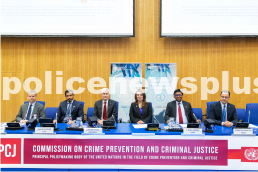Austria: In a momentous declaration made during a high-level Side Event at the 33rd Commission on Crime Prevention and Criminal Justice in Vienna, leaders of the FATF, INTERPOL, and UNODC underscored the urgent necessity for nations to intensify their endeavors in dismantling the vast networks of transnational organized crime and curbing the staggering proceeds generated illicitly. This imperative call to action not only reflects the pressing need to thwart conflicts fueled by these activities and the financing of terrorism but also emphasizes the profound adverse impact on vulnerable populations worldwide.
By shifting focus onto the ill-gotten gains and clandestine financial networks underpinning organized crime, Member States can significantly bolster their efforts in combating these pervasive networks and fortifying crime prevention strategies. Moreover, by targeting the financial incentives that drive criminal enterprises, governments can align their actions with the overarching objectives of the 2030 Sustainable Development Agenda, including fostering inclusive economic growth, ensuring financial stability, and fortifying institutional integrity and governance structures.
T. Raja Kumar, President of the FATF, emphasized, “The preservation of global financial integrity is paramount for fostering stability, inclusivity, and peace. Achieving this objective hinges upon the resolute and effective implementation of anti-money laundering and terrorist financing standards.” He further emphasized the imperative for collective action in implementing robust measures such as asset recovery to sever the lifeblood of criminal enterprises – their financial resources and assets.
Jürgen Stock, Secretary General of INTERPOL, echoed these sentiments, asserting, “Just as criminals exploit any avenue to amass profits, every conceivable effort must be exerted to deprive them of their illicit gains. Disrupting these illegal revenue streams is indispensable in upholding the rule of law and safeguarding vulnerable communities.”
Ghada Waly, Executive Director of UNODC, underscored the pivotal role of financial integrity in advancing peace, security, and sustainable development, emphasizing the necessity for concerted efforts among governments, the private sector, and international partners to dismantle the illicit financial networks sustaining terrorism and transnational organized crime.
While acknowledging recent enhancements to FATF’s international standards on anti-money laundering and terrorism financing, the leaders also called for accelerated progress on policy reforms and capacity-building initiatives ahead of the UN 2026 Crime Congress. They underscored the critical need for greater support to countries struggling with the effective implementation of anti-money laundering and terrorist financing frameworks.
Moreover, they recognized the positive impact of member countries collaborating with the private sector and civil society to implement collaborative approaches in combating financial crime. Operational endeavors through public-private partnerships and joint task forces are gaining momentum and enhancing the efficacy of global implementation efforts.
In discussions held under the theme “Taking the Profits out of Crime: Accelerating the Effective Implementation of Anti-Money Laundering and Countering the Financing of Terrorism Standards Globally,” participants highlighted the importance of capacity-building initiatives, the adoption of risk-based approaches, multi-sectoral partnerships, and technological innovations as key drivers to enhance effectiveness in the global fight against financial crime.
UNODC, FATF, and INTERPOL reaffirmed their commitment to championing this call to action, urging member states to strengthen their anti-money laundering and counter-financing of terrorism frameworks through the upcoming 2026 Crime Congress.










